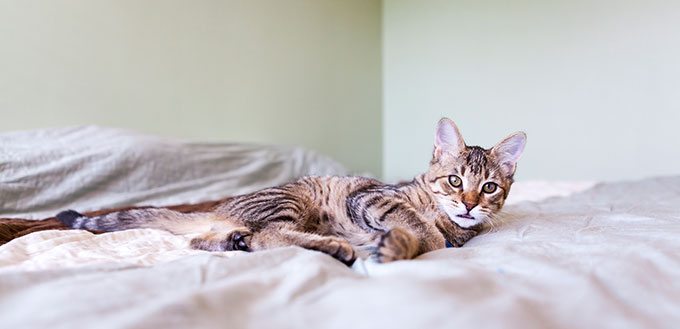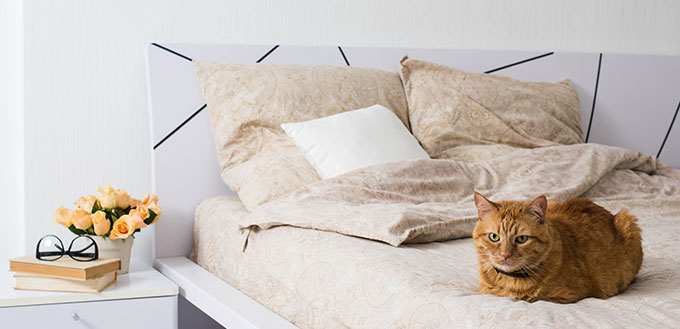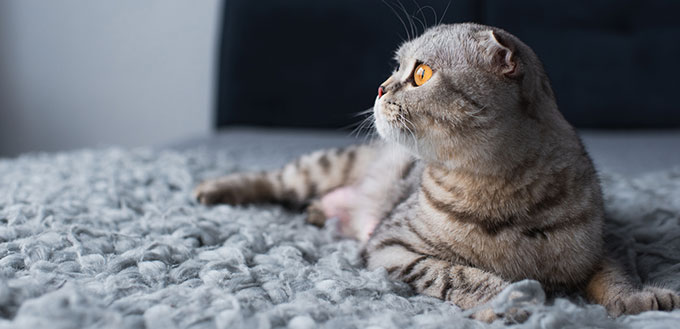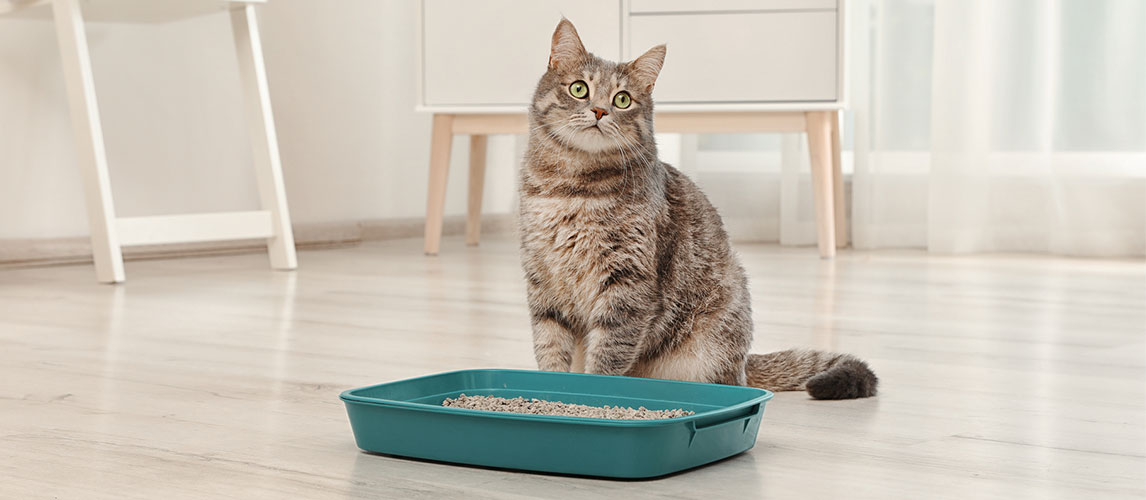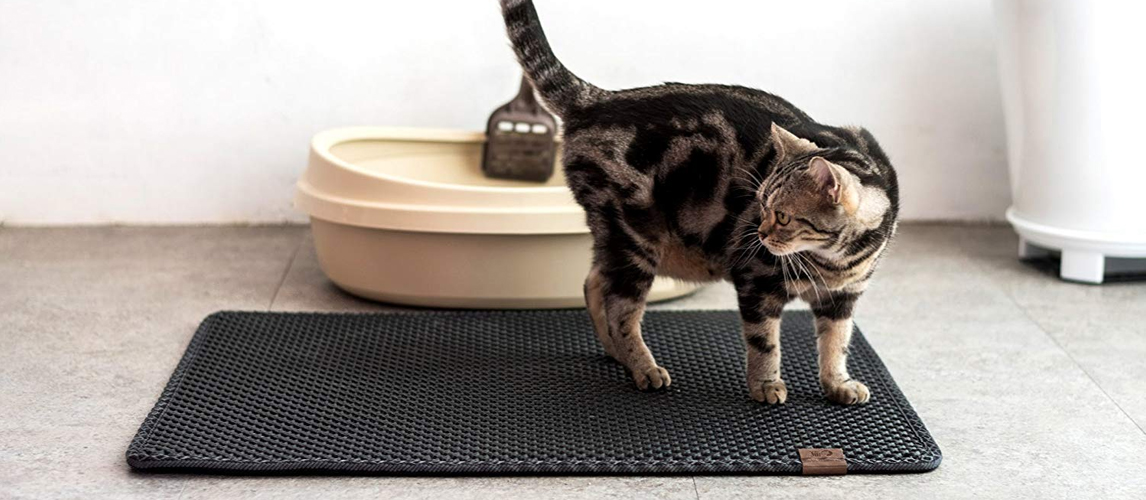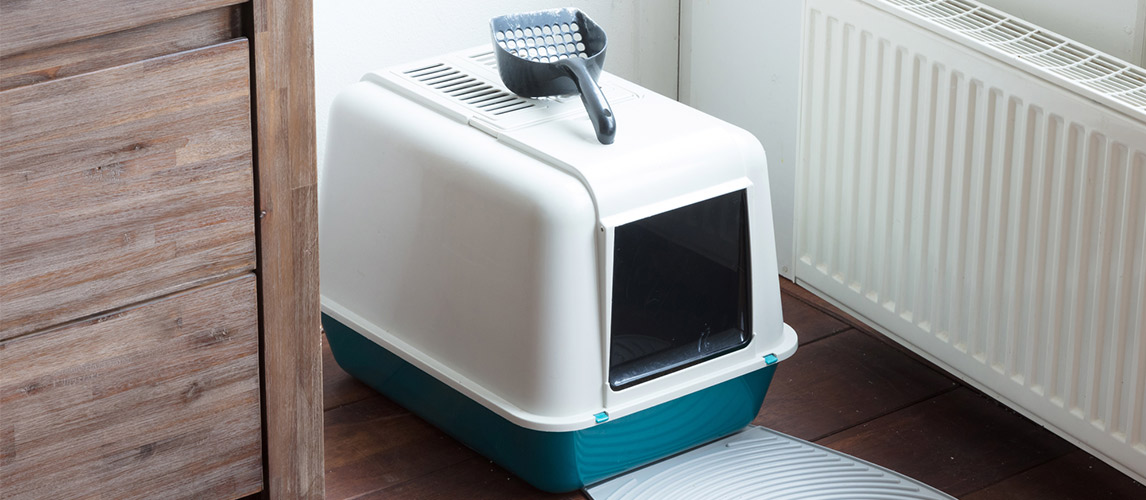Why is my cat peeing on my bed? This is a common question asked by many pet owners. As a cat owner, you’ll probably agree that having your feline companion constantly peeing outside of its litter box can be a little annoying. What’s even more off-putting is when they constantly soil your bed with urine, as this is one of the major spots that most people highly regard as a personal space. However, as difficult as it might seem to understand the reason your cute kitty cat would unexpectedly begin to view your bed as its litter box, it definitely has nothing whatsoever to do with revenge or even spite. Read on to get the full details.
Check the Condition of the Litter Box
You can start by thinking about your own personal bathroom setup. Probably, there is an attached door that can be shut for privacy, and perhaps that room has some welcoming decorations. Now, don’t you think your four-legged friend deserves something similar?
Also, plastic storage boxes might be a better option than the traditional cat litter boxes. You can just dispense the lid and have a small opening constructed on one side. Note that it’s not always necessary to cover a little box. Most covers are added to appeal to conceal and contain the content of the box.
However, if you are concerned about your kitty scattering litter out from over the box, it’s best to opt for the litter box with taller sides that are still uncovered. The only time it won’t be convenient is if you have an older arthritic kitty that may find it hard to climb over. Therefore, it should constantly be at the back of your mind that feral cats don’t even choose to do their business in the caves.
Related Post: Sifting Litter Box
Check the Condition and Location of the Litter Box
If the position of that litter box is in a busy corner of the house where you have noisy appliances like a washing machine, a cloth dryer, and the like, the noise emitted by such machines may be disturbing your cat’s concentration, pushing it to seek solace outside the litter box. It might even be that the position of the box was initially ideal for the kitty, but the spot lost its appeal with the passing years.
A cat that spends most of its time on the ground floor, with the litter box in the basement might never remember to use it; hence why it’s vital to equip each floor of your home with a litter box. No doubt, your cat may be averse to traveling a long distance just to eliminate waste.
Also, even though it has been established that cats see well under low light, they do need light to see. Thus, if the position of a litter box is in an unlighted area of the house, your furbuddy may be less inclined to make use of it.
For sure, so many other location issues abound. Perhaps, the poor cat might have to pass the favorite resting place of your pup before it can have access to the litter box. And if your dog gives it a hot chase on the way, it will most certainly avoid the location entirely.
Perhaps, the Litter Box Is Too Small?
Check the size of your cat’s litter box; is it spacious enough? A litter box is recommended to be 1½ times the cat’s body length excluding the tail. However, your best option is to make it as large as possible (the larger, the better).
Avoid Using the Wrong Type of Litter
There are cats that don’t have preferences over the type of litter they have, but we have seen a whole lot of them that do. To these ones, all litter are not the same; thus, they might demand one particular brand. Every cat parent needs to come to terms with the fact that the type of litter they purchase is not up to them; rather, they must put their fur baby’s preference into consideration.
Related Post: Dust Free Cat Litter
Among the ways that your cat can let you know that a litter is not to its liking is by eliminating on the bed or any other spot. Unfortunately, understanding your cat’s preference in litter is not a straightforward task – a serious trial and error process must be involved to determine which is the best for your furbuddy. To make the matter worse, people who run a multi-pet household will require double the effort.
Related Post: Cat Litter
The Problem Might Be Medically Related
When a cat keeps peeing on their owner’s bed, it may be a medical issue. The first step to take when you observe your furry friend peeing outside its litter box is to visit the veterinarian. He or she will carry out some physical examination alongside relevant diagnostic tests which will include the use of a urinalysis tube to rule out the possibility of underlying medical issues. What’s more, a cat with a bladder infection may end up associating the accompanying discomfort and pain with its litter box, making it to choose a more convenient location to eliminate.
Cat peeing on the bed might also be the result of other medical problems like bladder stones, which are known to cause serious inflammation as well as the urge to frequently urinate. Other infections that can lead to an inability to access the litter box include kidney disease, diabetes, and urinary tract infections – they may still cause an aversion to making use of the box. However, once the vet has ruled out all these conditions, then the problem may not be a serious one, but we must look closer to determine the cause.
Stress Might Be the Culprits
After you have ruled out all the possible medical conditions, the next common cause of feline bedwetting may be stress. Your four-legged friend might be anxious or stressed over things you may be ignorant of. Key among a cat’s stressors is poor litter box condition. The feline population is quite finicky – a dirty litter box, objectionable liter, or poor positioning of the box can become stressful, making them choose to do their business elsewhere.
Other things that can stress a cat include the arrival of a new family member – this can be a dog, human, or another feline. Other triggers include an adjustment in a family member’s schedule, nearby construction work, and random visits from strangers or any other anomaly in the home.
It May Be That One Litter Box Is Not Enough
Many cats love to poop in one litter box, while they have another one for urinating. Equally, there are that are averse to sharing space with a second cat; thus, multi-pet households should strive to get separate litter boxes for each kitty, plus an additional one.
Although this now means more litter boxes to clean; however, it’s still better than frequently cleaning your beddings. Cleaning those boxes can be tiring; for example, the litter must be scooped several times daily, must be emptied out, and the box washed with warm soapy water on a weekly basis. The box itself must be discarded at six months intervals and replaced with new ones.
The reason why multiple litter boxes are necessary, especially for kittens is that they are like children. What we mean is that their control over their defecation and urination process is yet to be fully developed; hence, the need for multiple and easily reached litter boxes to aid in preventing accidents.
Note that a cat close to the litter box or inside it should never be scolded at that position – this will only make it associate the box with negativity and, thus, avoid it. In the same vein, the litter box should never be taken as the right spot to confine a cat for grooming like nail clipping or ear cleaning. It is also not an ideal spot to administer medication.
Separation Anxiety
The topic of why cats pee on beds cannot be wrapped up without talking about separation anxiety. Cats have never been known to be socially solitary; rather, they often develop close attachments with their human families or other household pets. Some of them usually have a favorite person whom they follow about in the house. However, once this person is no longer available, the cat’s response might involve urinating on the bed, the couch, or any other spot where that person’s scent is felt.
You may also like our article on the Best Calming and Anti-Anxiety Products for Cats.
Conclusion
There is this assumption held by many people that a cat urinates on their owner’s bed out of spite. According to them, the feline is trying to get back at the parent because it is angry about something or a situation. However, this is far from the truth; rather, the cat might be struggling with something else. The list can range from stress, health issues, aversion to litter, and many more. You just have to look closer to decipher.
Related Post: How to Train Your Cat to Love Their Bed
Sources:
- Geoff Williams, 5 Reasons Your Cat is Peeing on the Bed, PetMD
- Urine-marking Behavior: How To Prevent It, The Humane Society
- Urine Marking (Spraying), The MSPCA–Angell


